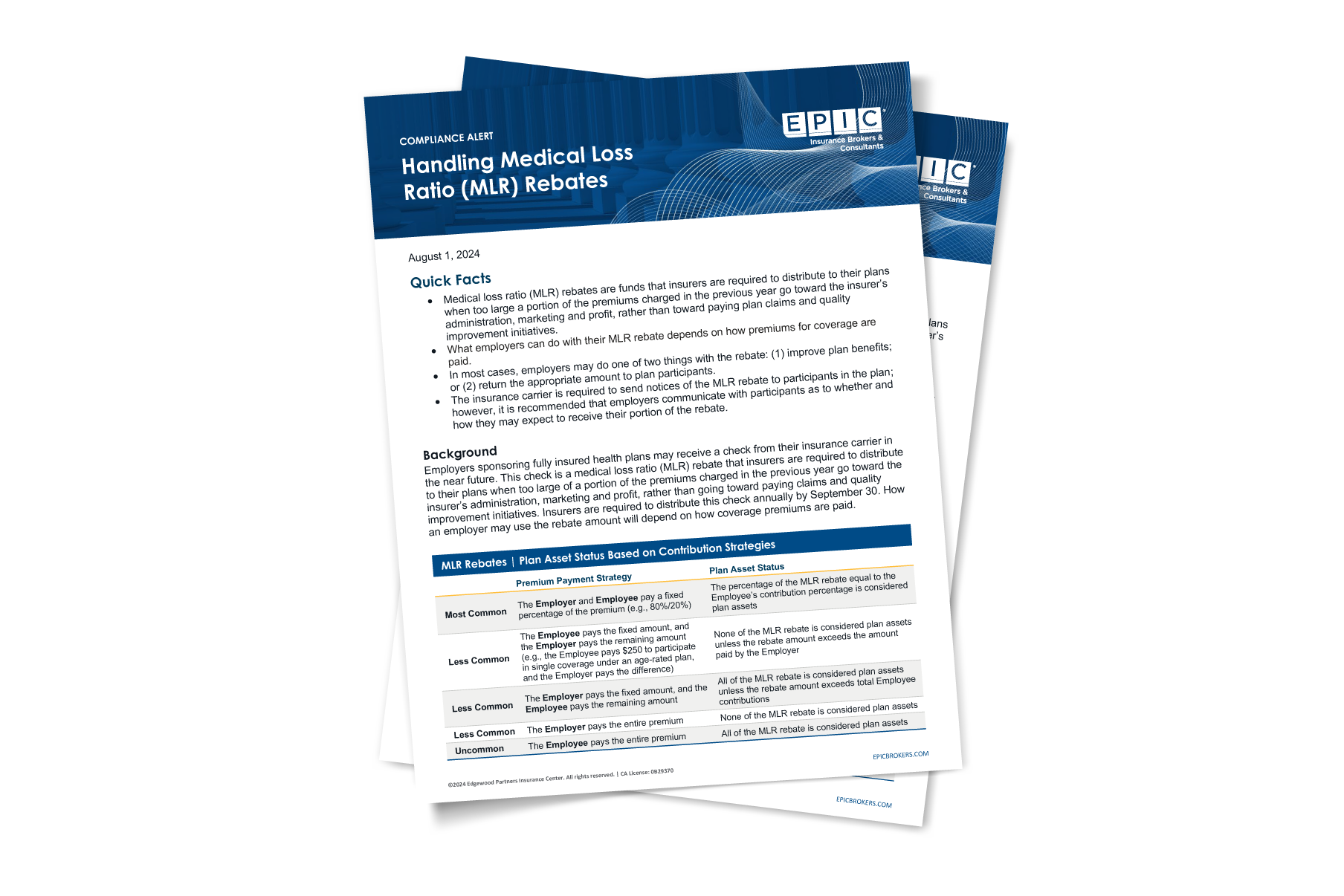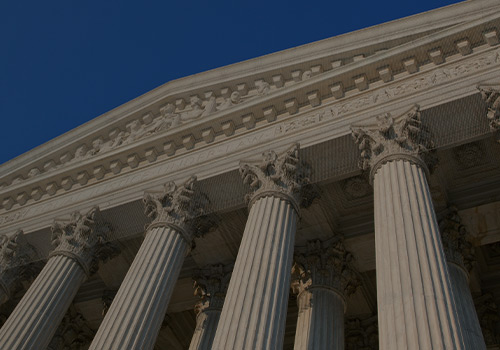Let our team help you navigate the ever-changing benefits compliance landscape each month. Check out this month’s latest alerts, additional updates, and resources hot off the press:
Employee Benefits Compliance Alerts
This month’s Compliance Matters newsletter provides a comprehensive review of the following topics. To obtain your copy, please use the form below to download.

- Special Compliance Alert: 2026 HDHP & HSA Limits
- Court Grants Abeyance in MHPAEA Lawsuit
- President Signs Executive Orders Targeting PBMs & Prescription Drugs
- Medicare Part D Redesign: Changes to the Simplified Determination Method
- Supreme Court Hears Oral Arguments in ACA Preventive Services Case
- State Series: Arkansas Law Prohibits PBM-Owned Pharmacies
- State Series: California Coverage for Assault Victims | Assembly Bill 2843
Download this month’s alerts
Additional Updates & Resources
Reminder! PCORI Due July 31
Employers who sponsored self-funded medical plans that ended sometime during 2024 are required to report and pay the Affordable Care Act (ACA) Patient-Centered Outcomes Research Institute (PCORI) fees no later than July 31, 2025. Fully insured plan sponsors can rely on their carriers to submit the fee on their behalf, but fully insured plan sponsors that sponsor a self-funded plan component, such as a health reimbursement arrangement (HRA), will need to file and pay for the self-funded component plan.
Payment amounts due in 2025 will differ based on the employer’s plan year. The Internal Revenue Service (IRS) provides a chart showing applicable fee amounts depending on the plan’s year-end date. The fees due in July 2025 are as follows:
- $3.22 per covered life for plan years ending after September 30, 2023, and before October 1, 2024
- $3.47 per covered life for plan years ending after September 30, 2024, and before October 1, 2025
Self-funded plans may use one of three methods to determine the average covered lives used for reporting and paying the PCORI fee: (i) the actual count method; (ii) the snapshot method; or (iii) the Form 5500 method. There are special counting rules that apply to employers offering multiple self-funded plans or an HRA integrated with a fully insured plan. The PCORI fee count and payment are submitted using the IRS Form 720.
House Passes “One Big Beautiful Bill”
On May 22, 2025, in a 215-214 vote primarily along party lines, the United States House of Representatives (House) passed House Resolution 1 (H.R. 1), also known as the “One Big Beautiful Bill Act” (the Bill). The intent of the Bill is to extend the 2017 Tax Cuts and Jobs Act (TCJA), and includes hundreds of other provisions, many of which directly impact employer-sponsored health plans. Some provisions affecting group health plans include:
- Expanded eligibility for health savings account (HSA) participants, including limited eligibility for Medicare Part A participants.
- Increased flexibility for participation in HSAs and flexible spending accounts (FSAs).
- Updates to HSA distributions, such as allowing reimbursement for gym memberships up to a certain limit.
- Increases to HSA contribution amounts for certain individuals.
- Codifying the 2019 individual coverage health reimbursement arrangement (ICHRA) rules and expanding salary reductions and a tax credit for first-time ICHRA plan sponsors and renaming ICHRAs as Custom Health Option and Individual Care Expense (CHOICE) arrangements.
The Bill will now go to the Senate, where it will likely be amended. As a budget reconciliation bill, the Bill requires only a simple majority to pass in the Senate.
EPIC is closely monitoring developments with the Bill and will provide updates as they become available.
Successful Challenge of IRS Collection of §4980H Penalties
In a recent case in federal court for the Northern District of Texas (Court), an employer that did not offer medical coverage to full-time employees received an Internal Revenue Service (IRS) Letter 226J proposing an employer shared responsibility payment of approximately $200,000 for 2019. The employer paid the penalty under protest, later requested a refund that was not granted by the IRS and then filed a claim challenging the IRS’s ability to collect such penalty payment. The employer claimed that the IRS should not have been able to collect the penalty because the employer never received Marketplace certifications notifying the employer of employees who enrolled in subsidized Marketplace coverage. Marketplace certification is a required part of the §4980H enforcement process.
The Court found in favor of the employer, indicating that the failure of the Department of Health & Human Services (HHS) to send Marketplace certifications to the employer did not provide the employer with the required notice and opportunity to appeal, so the IRS penalties were not enforceable. The employer received a refund.
It is unclear what this means for coverage requirements and whether the IRS will be able to enforce §4980H penalties if employers don’t first receive Marketplace certifications. However, the decision could be appealed to a higher federal court, and/or the IRS and HHS could make changes to the current process. This is certainly something to watch, but for now, applicable large employers (50 or more FTEs) should continue to offer minimum value, affordable coverage to full-time employees and their dependent children and report on such offers of coverage using Forms 1094-C and 1095-Cs. The Court’s decision can be found here.
Florida PBM Audits Cause Questions About Claims Data Collection
In May 2023, Florida Governor Ron DeSantis signed State Bill 1550 (SB 1550) enacting the Florida Prescription Drug Reform Act. For more information, access our prior Alert from March 2024. The Act created Florida Statute 626.8825, focusing on pharmacy benefit manager (PBM) transparency and accountability, and amended other sections of Florida Statutes. The law took effect on January 1, 2024.
Part of the new law requires the Florida Office of Insurance Regulation (FOIR) to conduct biennial audits of PBMs operating in the state of Florida. To complete these audits, FOIR requires PBMs to submit extensive amounts of claims reimbursement data, including some data that contains protected health information (PHI).
Plan sponsors of self-funded plans that operate prescription drug plans under these PBMs are questioning whether this rule can require self-funded plans to submit claims data or whether this rule is preempted by the Employee Retirement Income Security Act (ERISA). Some experts have weighed in on this issue, stating that these requests are preempted for self-funded plans under a 2016 Supreme Court of the United States (SCOTUS) decision in the case Gobeille v. Liberty Mut. Ins. Co. In that decision, SCOTUS held a Vermont all-payer claims disclosure law, was applicable only to the plan’s service provider (BlueCross BlueShield of Massachusetts) and preempted by ERISA because it upset nationally uniform plan administration and sought to regulate a central matter of plan (reporting and disclosure), an administrative duty already governed by ERISA. Because Florida law requests similar information for reporting and disclosure purposes, it is likely to assume that this law is also preempted by ERISA.
Self-funded plan sponsors who receive requests for claim data collection with questions about compliance should consult their ERISA counsel for guidance.
Monthly FAQ: Which COBRA events allow an extension past 18 months?
An individual entitled to an 18-month maximum period of continuation coverage may become eligible for an extension of the maximum time period in two circumstances. First, when a qualified beneficiary is disabled; Second, when a second qualifying event occurs.
Disability | In the event of a qualifying disability, of any of the qualified beneficiaries in the family, all of the qualified beneficiaries receiving continuation coverage due to a single qualifying event are entitled to an 11-month extension of the maximum period of continuation coverage (for a total maximum period of 29 months of continuation coverage). The plan can charge qualified beneficiaries an increased premium, up to 150% of the cost of coverage, during the 11-month extension of disability benefits.
Second Qualifying Event | An individual you may become entitled to an 18-month extension of a current continuation period if that individual experiences a qualifying event that is the death of a covered employee, the divorce or legal separation of a covered employee and spouse, a covered employee’s becoming entitled to Medicare (in certain circumstances), or a loss of dependent child status under the plan. The second event can be a second qualifying event only if it would have caused you to lose coverage under the plan in the absence of the first qualifying event.

More Compliance Resources
- Sign up for our in-depth Compliance Webinars
- Learn about our Compliance Consulting Services

WANT TO GET COMPLIANCE MATTERS IN YOUR INBOX?
Sign up for the monthly newsletter.